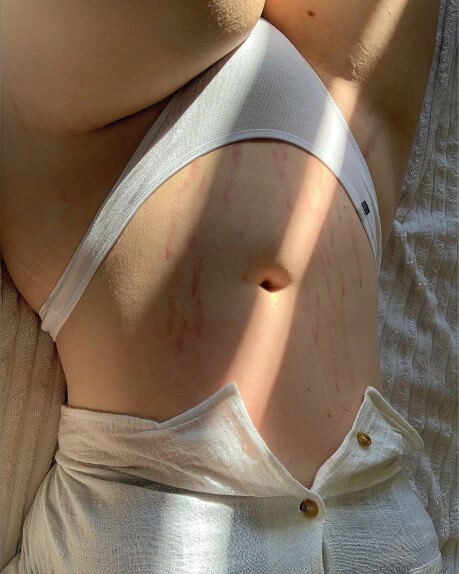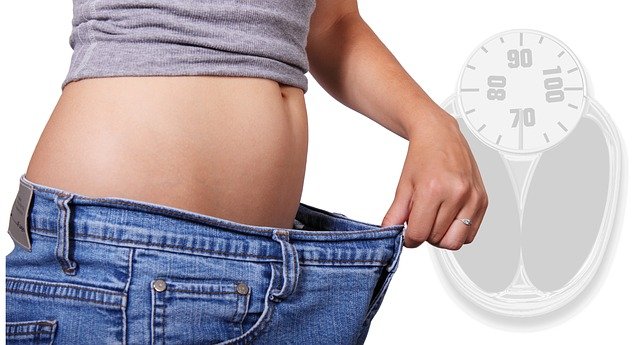Many people have a stretch mark, or “striae distensae” on their skin, whether that’s from weight gain or general growth. Stretch marks during pregnancy are very common, but this is far from the only source of stretch marks on the skin tissue for most people.
If you’ve noticed stretch marks, you may be wondering what has happened to cause stretch marks, what you can do to prevent stretch marks, and what sort of treatment may also help with your marks.
There’s no need to worry, though; stretch marks are a natural thing that happens to your body in various situations, particularly for women during pregnancy or for anyone who happens to gain weight at any point in their life (which is nearly all of us, at one point or another in our lives).
Are stretch marks dangerous?
Stretch marks (striae distensae) are not dangerous at all, but a stretch mark or any other blemish on your skin could cause dissatisfaction with your body and your appearance, and doing something about that may help you to feel more confident in your own body.
Read on below to find out everything you ever wanted to know about stretch marks, how to get rid of stretch marks, and what factors can cause stretch marks in your life. There are no risk factors when it comes to stretch marks however sometimes they can cause a burning/itching sensation with some people.

What do stretch marks look like?
Stretch marks may usually begin as reddish or purple lesions however, they can be bright pink, dark brown, black, silver, reddish brown, or even purple. It depends on your skin color, They usually appear quite dark, to begin with, but over time they begin to fade. They can also feel slightly raised and can appear on all skin types.
Where do they appear?
They can appear anywhere on your body but they usually appear where large amounts of fat are contained. Such placement like, around the stomach area, around the breasts, upper arms, back, thighs, hips, and buttocks. However, over time they may fade and become unnoticeable.
Are stretch marks bad?
They may not be dangerous, but are they bad? Well, that depends on how you feel about your skin and your body. Your own feelings about your body are of course among the rights reserved for you – if you’re happy with your own skin, then that’s great, but if you’re not, then the rights reserved to you include your right to feel dissatisfied and want to seek medical advice on how to make stretch marks fade more.
This is particularly the case for many women, who are much more likely to develop stretch marks than men are.
However, there’s no particular medical reason to worry about stretch marks. Developing stretch marks early stretch marks or newer stretch marks is not a thing to worry about nowadays as you can talk to a doctor to provide medical advice, laser treatment, such as pulsed dye laser therapy. Though cosmetic surgery isn’t always the best, especially if you have prior medical conditions or medical history.
Is there anything I can do to help them fade?
Though now there are so many creams that help stretch marks fade, from academic research institutions doing studies to just general trustworthy health information.
Stretch marks on your skin are a natural occurrence for many people, especially women, and they have absolutely no impact on your health and life beyond their cosmetic effect on your skin.
Stretch marks on areas of your skin that are more visible might be more of a problem for your self-esteem and might be something that you may wish to seek treatment for.
Microdermabrasion involves exfoliating in a way that at-home remedies cannot. Research has shown that Trusted Source microdermabrasion improved the overall appearance of stretch marks.

What is the cause of stretch marks?
Stretch marks are small scars that are generally caused by sudden growth or a massive increase in weight in which has caused skin stretching. Breast enlargement surgery can also cause them. That covers a wide range of different things that may cause stretch marks, not all of which are bad at all.
Anything that causes your body to change size rapidly can affect your skin, which will develop stretch marks as a result. If you gain weight, then your body expands, stretching your skin and causing stretch marks. It’s not just weight gain that stretches your skin, though.
Periods of rapid growth during puberty may also cause stretch marks on your skin, and this sort of growth is entirely unavoidable. Stretch marks can also be caused by a rapid increase in muscle, such as if you’re using steroid creams or tablets, or anything else that may cause swelling that disrupts your skin.
One of the biggest causes of stretch marks on your skin is pregnancy, as this causes very significant changes in size in a fairly short period of time, stretching your skin much more than most other occasions. There’s no real way to prevent stretch marks during pregnancy, but careful skincare may help to reduce their visibility at the very least.
How do you get rid of stretch marks?
Just like any other type of scar, stretch marks are permanent, but several treatment options may reduce their visibility, as well as treatment that might prevent them from itching as they fade, helping your skin to appear smoother and cleaner.
Not every treatment will work for everyone, and many things sold as treatments for stretch marks are ineffective.
Research indicates that most treatments for stretch marks only work on early, new stretch marks (although these treatments should not be used while pregnant or breastfeeding), and will be almost completely useless on older stretch marks.
You’re also going to need to gently massage the lotion into your stretch marks, making sure it gets properly absorbed by your skin, and do so every day for several weeks to get any results at all. Hyaluronic acid can improve the appearance of stretch marks.

Do home remedies work?
In general, popular home remedies such as almond oil, olive oil, or cocoa butter are pretty much completely useless for dealing with stretch marks. Research indicates that these products have little or no effect on healing, and are just a waste of time, money, and effort.
What happens to stretch marks when you lose weight?
Unfortunately, the question of what happens to stretch marks when you lose weight is one with no clear, satisfactory answer. It depends on how fast you lose weight and the precise nature of your skin, which will be unique to you.
Some people may find that losing weight can help their stretch marks slowly fade. It won’t happen immediately, but over a few weeks, they may start to fade slowly. They are very unlikely to disappear completely, but they are quite likely to fade and become less noticeable.
What happens if you lose weight fast?
If you lose weight very fast, however, then this may actually make your stretch marks worse. Fast weight loss means that your physical shape changes quickly, and your skin can’t keep up with it, just like if you gain additional weight quickly.
This is going to vary from person to person, however, as everyone has different skin that will heal differently, giving different effects when you lose weight. Just like how everyone gains and loses weight differently, stretch marks will vary between different people significantly.
What can you do to prevent stretch marks?
Sadly there is no way to prevent stretch marks especially pregnancy stretch marks and rapid weight gain stretch marks. Sudden weight gain is usually the cause especially with pregnant women in which causes skin change as the skin stretches.
Even if you use lotions and creams there is no sure way to prevent it, however keeping a healthy weight, eating well, and exercising regularly will help to avoid causing stretch marks to appear on your body that can be caused by sudden weight gain and weight loss.

Conclusion
The appearance of stretch marks happens to everyone (or at least almost everyone) at some point even those with normal skin, and they are nothing to worry about, you can develop early stretch marks or pregnancy stretch marks that happen from the skin fibers stretching. More elastic fibers can be helped along with topical creams which help to increase collagen production (the major protein that makes up the connective tissue in your skin).
They aren’t dangerous, they’re hard to avoid, and there’s not much you can really do about them. If they’re bothering you, though, then there are several different treatments available for you to try.
Just remember to keep on applying them regularly for several weeks if you want to see any results at all!


